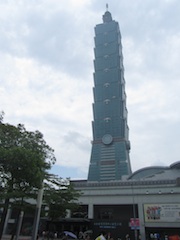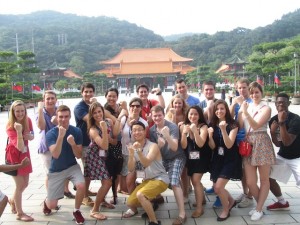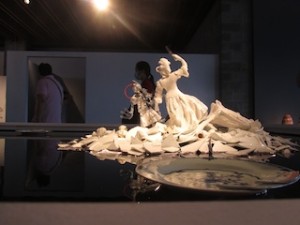![]()
Name: Scott Moore
E-mail: smoore10@nd.edu
Location of Study: Taipei, Hong Kong, Beijing, Shanghai
Program of Study: Summer China Business & Culture
Sponsors: Liu Family
![]()
A brief personal bio:
I am studying economics and political science at Notre Dame. In addition, I have taken two semesters of Chinese, so I am looking forward to honing my language skills. After spending a year in Berlin and becoming fluent in Germany, I am looking forward to taking the first steps to fluency in Chinese by actually visiting four cities in China.
Why this summer language abroad opportunity is important to me:
My SLA Grant allows me to spend six weeks of the summer in Taipei, Hong Kong, Beijing, and Shanghai. The program that the grant is funding includes culturally-based coursework, corporate visits, and extensive travel. As a student of Chinese, I am excited about the opportunity to take initiative and learn the language through personal interactions independent of the general program. In addition, I will be able to evaluate whether I would want to eventually study abroad in any of the cities I visit. Finally, my vocational interests are well-aligned with the experiences I will have while in China. I am looking forward to visiting corporate offices and networking with professionals and Notre Dame graduates working in Asia.
What I hope to achieve as a result of this summer study abroad experience:
I am hoping to improve my Chinese proficiency. dramatically. I would also like to gain extensive area knowledge of the four cities, despite the obvious time constraints. Professionally, I would like to establish contacts in Asia in order to expand my network. Most importantly, because I intend to study abroad during my junior year, it is vital that I can grasp the character of each city and decide which city or cities would suit me best for the academic year.
My specific learning goals for language and intercultural learning this summer:
At the end of the summer, I will be able to order food, ask for directions, and give directions with no problems.
By the end of my stay in China, I will be able to better understand the underlying cultural forces at work in Chinese people, especially the nuances between different in cities in China.
After spending time in China, I will have a greater mastery of the tonal aspect of speaking Chinese.
My plan for maximizing my international language learning experience:
I have studied abroad before, so I am well aware of how difficult it can be in the first few days to keep moving. However, simply put, adrenaline must be the fuel to keep me active and engaged. I am on a mission to soak in as much as I can in six weeks, and I need to be “on” the entire time. To accompany this energy, I have done a lot of research beforehand, so that I know what to expect in each city, and how to best apply myself accordingly.
![]()
Reflective Journal Entry 1:
Reflective Journal Entry 2:
We are about to land in Taipei, Taiwan. My four flights total have already surpassed 24 hours. I expected to be more tired than I am, but I have a feeling jet lag will catch up to me later this evening. Luckily, I was able to sleep quite a bit on all of my flights.
Already, I get a sense of how prepared we have been. We are already thinking in terms of food pricing for China, and it feels crazy to spend $10 for a sandwich and a drink at LAX, considering $10 apparently can buy us 3-4 meals abroad.
It will be really difficult to practice Mandarin in Taipei, so my focus for these 5 days is cultural acclimation. Also, I will be taking time each day to brush up on vocabulary. The freshest material that I learned in my Chinese course was actually about luggage and travel, so understanding airport announcements is not too difficult. There was also a message over the intercom about avian flu symptoms, and my friend and I both were able to comprehend “If you have a fever, immediately consult a doctor.” It’s really exciting to hear Chinese all around me.
Reflective Journal Entry 3:
Sink or Swim
The most exciting part of going abroad is the survival mentality that arises when faced with challenges. I am eager to share a few exciting developments about life in Taiwan.
My first meal in Taiwan was an authentic buffet lunch. All that was provided were chopsticks or soup spoons. It would have been easy to take a “No Fork, No Service” mentality, as I had no clue how to use chopsticks. I was nervous, because I have spent many hours trying to learn without success. However, by the end of the meal, I was using them just fine. In fact, this morning at the hotel breakfast, I was eating noodles with chopsticks with absolutely no problem.
I have also been able to find ways to practice my Chinese. I had a brief conversation with the doorman at my hotel. I also wanted to practice my skills on the phone, so I called the front desk to ask for a pair of scissors. She responded that she would bring up a pair to my room later, and I was able to explain to her that I wanted to come down and use them now instead. In addition, I went with another first year Chinese student to a nearby store to order coffee in the morning. We were able to order medium iced coffees with sugar but no cream without too much difficulty.
Still, I often feel that I am spending a lot of time reinforcing the Chinese I already know, and making less progress in learning new vocabulary. As we go out today to visit many tourist sites (think Taipei 101!), my focus today is learning xin de kewen, or new vocabulary! I did learn the word for emergency. Also, it is fun to see how words I already know can be synthesized. Pieces of the words for going out (chuqu) and intersection (lukou) combined to form the word exit, (chukou). Additionally, a fire hydrant is called chushuikou, which translates literally to water exit. Very cool!
Reflective Journal Entry 4:
A Breath of Fresh Air
We visited Hong Kong for a few days, and now we have reached Beijing! As for air quality, Beijing is known for smog. There is an app you can download, as the pollution fluctuates throughout the day. Oftentimes, the wind is the only factor that brings about higher levels of pollution. We were given masks to wear, and every person I talk to gives me a different number. “If the air is over 150, you should wear one.” “Once it gets to 300, I wear mine.” “200 is as high as I go.” “You should be fine unless it surpasses 300.”
However, Beijing is my opportunity to learn Chinese, and that’s why I’m on the program. Hong Kong was a beautiful city, but from the standpoint of language acquisition, it was often frustrating. Many people who understood my Mandarin would reply in English, or pretend not to understand. Our visits focused exclusively on history and corporate interests, which are clearly the specialties of Hong Kong, but it was difficult to find Mandarin anywhere except tourist sites, and I was not keen on visiting tourist sites.
Yesterday, we met with the Notre Dame alumni club of Beijing. I had a great time. The meeting took place at an American restaurant in a Western-style mall. However, there was a huge park outside (Hong Kong had no space whatsoever where we had stayed). l made friends with a six year old kiddo who has half the energy of my actual six year old brother (a lot of energy). He called me older brother, and we ran races, jumped around, and did somersaults. We spoke Chinese. He spoke with speed and precision. I did not.
Unlike Hong Kong, Beijing is instilling in me a true passion to learn this language. We’ll see how I do at dinner. Either way, I’m breathing easily.
Reflective Journal Entry 5:
The Best of Beijing (Part 1)
The twelve hour train from Beijing to Shanghai offered me the chance to reflect on my time in Beijing, which was my best opportunity to practice Chinese. In Shanghai, they speak a dialect that deviates from official Mandarin, so I am expecting to face greater challenges there. Many times in Beijing, I have gone off on my own to ask for directions, get lost, grab a bite to eat, and find my way back without English. At this point, I can honestly say that I have made substantial progress. I have a friend who lives and works in China, and we made dinner plans. After beating her to the restaurant, I was able to order a table for two and explain that I would like to wait a few moments in a visible place so we could meet more effectively. When alone, I have been able to order delicious foods at authentic restaurants, sometimes even simply by saying, “Surprise me with any meal under 25 kuai ($4).” It’s times like these when the process of learning a language is really enjoyable. I can direct a cab, rather than handing him a slip of paper. My only struggle continues to be learning new characters. Unlike any other language, I truly believe characters are best taught through rote repetition in a classroom setting. I’ll figure it out eventually.
Reflective Journal Entry 6:
While I posted yesterday about my growth in terms of linguistic proficiency, I feel that it is also important to address the actual activities I did in Beijing. We were able to visit the Great Wall, which was heavily marketed towards tourists. Eventually, we were able to walk beyond the official sectioned-off tourist area of the Wall, and ten minutes later, the view was stunning!
Additionally, we were able to visit Reuters in China, as well as Caixin Media. In the case of Reuters, China cared less about censorship and more about where reporters visited to cover a story. At Caixin, all articles actually passed through censors, who sometimes edited out sentences or paragraphs, and sometimes scrapped articles entirely. Ironically, our contact at Caixin was softer in his criticism of censorship, because the impact of censorship has become more relaxed recently. Reuters acts as a source for media outlets, so they don’t have to deal with direct censorship.
Another important visit was to the Carnegie Think Tank at Tsinghua University. The experience allowed us to ask a ton of questions to experts who not only project China’s future development but also interact regularly with diplomats and politicians on both sides.
These are mere snapshots of my experience in Beijing, but my grasp of a few Chinese words and phrases has allowed me to get extra time to ask questions and dig deeper into everyday life in Beijing. I hope my experience in Shanghai is similar.
Reflective Journal Entry 7:
I am now at the halfway point for my time in Shanghai, and I will be returning to the U.S. in exactly one week. Specifically today, I had the chance to visit a church in Shanghai and wish a happy father’s day to some dads. It was refreshing to be back in a church. Before coming here, I was nervous about Shanghainese another “dialect” of Chinese that is impossible to understand. In actuality, everyone here speaks and understands Mandarin as well. In speaking to other foreigners, nearly all of them use Mandarin to communicate without any difficulty at all.
Thus, my Chinese has been improving. A few days ago, I got a haircut for 15 yuan ($2.50). My hair was washed, and then I explained exactly how I wanted it cut. It worked out quite well. Because the haircut was so cheap, I ended up purchasing gel as well.
I now have no problems at all at restaurants (asking for a menu, napkins, the check). In China, you call the server to your table whenever you need something. Servers do not come by to check on you, so if you don’t know you’re supposed to scream “fuwuyuan,” you will literally never be served. I no longer have any problems calling servers to my table. I no longer need picture-only or subtitled menus to order food.
I haven’t gotten lost at all on this trip, but I think that comes down to planning in advance rather than my Chinese skills. I haven’t used much Chinese to ask around for directions. Instead, I normally ask where certain stores might be located, or the closest place to call a cab. There are some moments when I begin thinking in Chinese, but I have never dreamed in Chinese. I will have to study abroad here to be truly successful in Mandarin. However, these six weeks have helped me understand the importance of continuing my study of Chinese — that includes the commitment. It will take 3 to 4 times longer to learn Chinese than it did to learn German, so at least two years of an immersive experience (living in China) will be necessary to truly master the language.
![]()
Reflection on my language learning and intercultural gains:
I’m currently at the airport, ready to leave Shanghai. It is crazy to think that I have been in Greater China for over a month, as time has flown by in four different cities. Internet access in China has been extremely spotty due to censorship and regulation, so I have had the opportunity to unplug from FaceBook, YouTube, Gmail, and other blocked websites here. Instead, I have tried my hand at Chinese platforms – Baidu, Weibo, Weixin, and so on.
After six short weeks, I can firmly say that I have a long way to go before my Chinese is proficient. From a speaking standpoint, I can communicate far better than I could before I arrived in many settings (restaurants, banks, airports, academic environments, etc.) However, my knowledge of Chinese characters seems far more stagnant. I honestly have only picked up a few more characters since arriving here, because there are far more opportunities to speak than to read signs or write.
Another huge breakthrough for me has been my ability to go between languages. When I compare my Chinese skills to my German skills, I can more easily track my progress. Although my German is basically as good as my English, and I have translated professionally between languages, it would be difficult for me to translate in a professional context. Flipping back and forth between languages can be difficult. With regards to Chinese, I have always noticed that speaking English makes it more difficult to stay in my “Chinese zone.” The effect is even more pronounced for German. However, yesterday evening, at a World Cup showing where many Germans were present, I was able to seamlessly transition between German and Chinese. The amount of time it takes to move back and forth between my three languages has been reduced significantly.
I can’t wait to return to China and learn more!





It’s 2:38 a.m. in the morning, and I just finished packing. In the past five days, there has been a flurry of activity all around me, so ironically, spending time in planes and airports seems like a refreshing break. Because I will be flying directly to another city to intern upon my return, I had to pack both for China and for when I get back. In addition to packing, I did my best to complete as much of my coursework as I could in advance. This strategy would allow me more time in China to explore and learn the language. Because I will be traveling to four different cities, it feels like there is honestly no chance of formulating expectations for what I might encounter in each place. I am excited to take new experiences as they come, and I really hope I can manage to figure out how to negotiate my lease for an apartment in the US — while abroad.
I am most eager to see how our group comes together as the trip progresses. There are 3-4 people I would say I know well. Then, there are another 3-4 who I have met and am getting to know pretty well. Yet and still, there are 19 of us going, and I look forward to meeting them all. The layover in Los Angeles and the long flight to Hong Kong, and then Taipei should allow us the chance to interact more. If anything, our nervousness will bring us together. Only a handful of people in the group have been to China in the past.